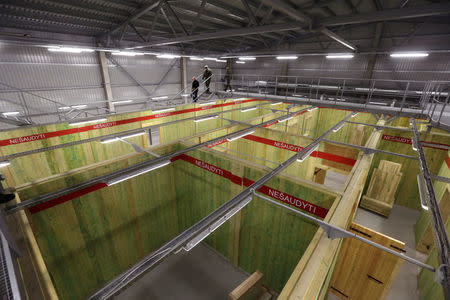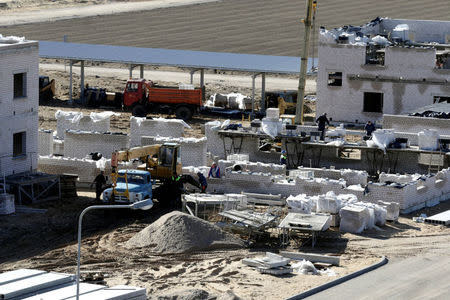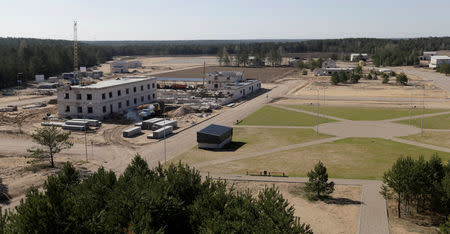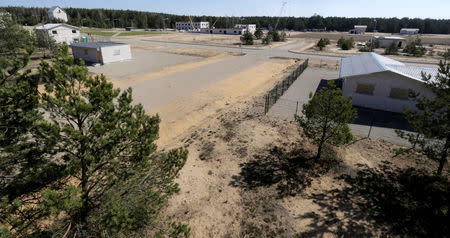Spooked by Russia, Lithuania spares no money for defense
By Andrius Sytas PABRADE TRAINING AREA, Lithuania (Reuters) - The town doesn't have a name yet, but its buildings are nearly finished and its roads are all laid out. Yet nobody will ever call it home. Worried by an increasingly militarist Russia next door, Lithuania is putting the finishing touches to the dummy settlement in the Pabrade training area so it can teach its soldiers how to fight in towns and villages. The first such facility in the Baltic states, it is seen as a symbol of how seriously those countries now view the threat from Russia, their former overlord. The largest of the three Baltic nations, Lithuania only started taking defense seriously in 2014, when Russia annexed the Crimean peninsula in Ukraine. Vilnius is now increasing defense spending by about a third every year, the highest rate in the NATO alliance. Lithuania will spend 725 million euros on defense in 2017, about 1.8 percent of its economy and almost as much as it spent in the three years from 2011 to 2013. "This has made our country more defendable, and deterrence against potential enemies has increased," defense minister Juozas Olekas told Reuters. In 2013, Lithuania spent only about 0.8 percent of its gross domestic product on defense, far below the unofficial NATO threshold of 2 percent. Only Luxemburg spent less. Since 2014, Lithuania expanded its armed forces, partly by reintroducing conscription, and armed it with modern weapons, including anti-tank and anti-aircraft missiles. Training areas are being updated and will double in size and capacity by 2022. Although the new town in the Pabrade training area doesn't yet have a name, the road sign at its entrance says Vilnius, the capital of Lithuania. Built at a cost of almost 5 million euros, the village has 26 brick two-storey houses around large central square, including a police station, a bus station with a shopping center, a schoolyard with a full-sized soccer field, and a high-vaulted church. "It wouldn't be a Lithuanian village without a church in it, would it?” says Captain Nerijus Rocevicius, commandant of the Pabrade training area. FIGHTING IN SEWERS An underground sewer has been installed so soldiers can practice fighting below street level. "Unlike in the movies, the enemy will shot at not only from windows but also from up above and from down below," said Rocevicius. More than a thousand troops at a time will hone their defense and attack skills here, supported by tanks and armored vehicles. Lamp-posts, benches and rubbish bins line signposted streets, and windows are boarded up to simulate wartime conditions. Pretend town-dwellers – policemen, children, distressed citizens – will be present in July, when the military plans its first exercise. A similar town will be built in another Lithuanian training facility in 2019. A close-quarters range, where soldiers use live ammunition to shoot dummies hiding in a maze of small rooms and corridors, is already in use. Lithuania wants to show it is playing its part when it asks NATO allies at a summit in Warsaw in July to send more troops to the Baltic region to keep it safe from Russia. Two of the U.S. Air Force's most advanced jets landed in Lithuania on Wednesday in a show of support for a region worried by Russian military maneuvers. The Baltic states and Washington have been angered by Russian warplanes making "simulated attack passes" near a U.S. warship and another passing close to a U.S. reconnaissance plane. A study by the RAND Corporation, a U.S. defense think-tank, said Russia could overrun Estonia, Latvia and Lithuania in three days, leaving NATO and the United States with no good options to respond. About seven brigades, three of them heavily armored, would be needed to prevent this, the study found. Lithuania is worried by Russia's so called anti-access area denial (A2/AD) capability, by which it could keep out reinforcements by using missiles, submarines and other forces from its Kaliningrad enclave between Poland and Lithuania. This is something the alliance knows it must deal with, outgoing NATO Supreme Allied Commander Europe Philip Breedlove said last month in Vilnius. "We have the capability, but we probably need to work on our capacity to address A2/AD", he told reporters. "This is not unique to Kaliningrad, it's happening in the Black Sea, it's happening in the Eastern Mediterranean and other places along NATO's periphery. And so as an alliance we need to be able to deal with A2/AD, as it would constrain any of our future options," Breedlove said. Lithuania accounts for less than one-thousandth of NATO's total spending and last year the country's defense budget was about 140 times smaller than Russia's. Annexed by the Soviet Union in the 1940s, the three Baltic nations regained their independence in the 1990s and wasted little time in joining NATO and the European Union. (Reporting by Andrius Sytas; editing by Giles Elgood)






